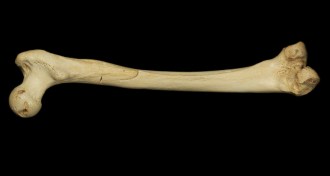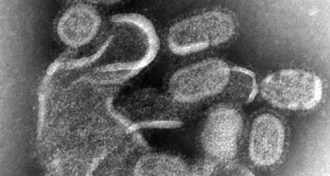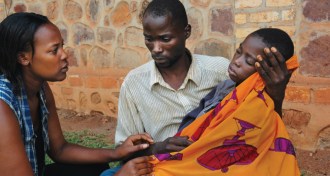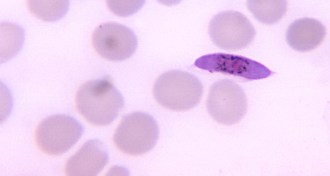Humans
Sign up for our newsletter
We summarize the week's scientific breakthroughs every Thursday.
-
 Health & Medicine
Health & MedicineTriplet births decline as IVF practice evolves
The number of U.S. pregnancies resulting in three or more babies has gone down since 1998.
By Nathan Seppa -
 Health & Medicine
Health & MedicineCell counts provide a read on ovarian cancer
New technology might discern which tumors are most dangerous and help guide treatment.
By Nathan Seppa -
 Anthropology
AnthropologyAncient hominid bone serves up DNA stunner
Spanish hominid fossil from 400,000 years ago reveals genetic ties to Asia’s mysterious Denisovans.
By Bruce Bower -
 Health & Medicine
Health & MedicineForecasting system predicts peaks in flu outbreaks
A real-time forecasting system has accurately predicted the peak flu cases up to nine weeks before the outbreak.
-
 Psychology
PsychologyThe Tell
The Little Clues That Reveal Big Truths About Who We Are by Matthew Hertenstein.
By Sid Perkins -
 Health & Medicine
Health & MedicineTV linked with brain changes in kids
A new study of Japanese children gives more reasons not to park kids in front of the tube.
-
 Health & Medicine
Health & MedicineCancer vaccine in near future foreseen
Excerpt from the December 21, 1963 issue of SCIENCE NEWS LETTER.
-

-
 Science & Society
Science & SocietyHeal thy neighbor
As antidepressants and other drugs gradually replace psychotherapy in the United States, new forms of the talking cure are growing in popularity in developing countries ravaged by civil war and poverty.
By Bruce Bower -
 Psychology
PsychologyGut reaction could foretell marriage satisfaction
Unconscious gut reactions may predict happy, and not-so-happy, marriages, a new study suggests.
-
 Life
LifeCompounds defeat malaria at every step
Experimental drugs are first to kill all stages of the parasite’s infection cycle.
By Beth Mole -
 Health & Medicine
Health & MedicineSimple dietary supplements could help stave off AIDS
Many people newly infected with HIV stayed healthy on regimen involving multivitamins and selenium.
By Nathan Seppa